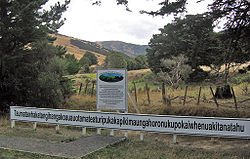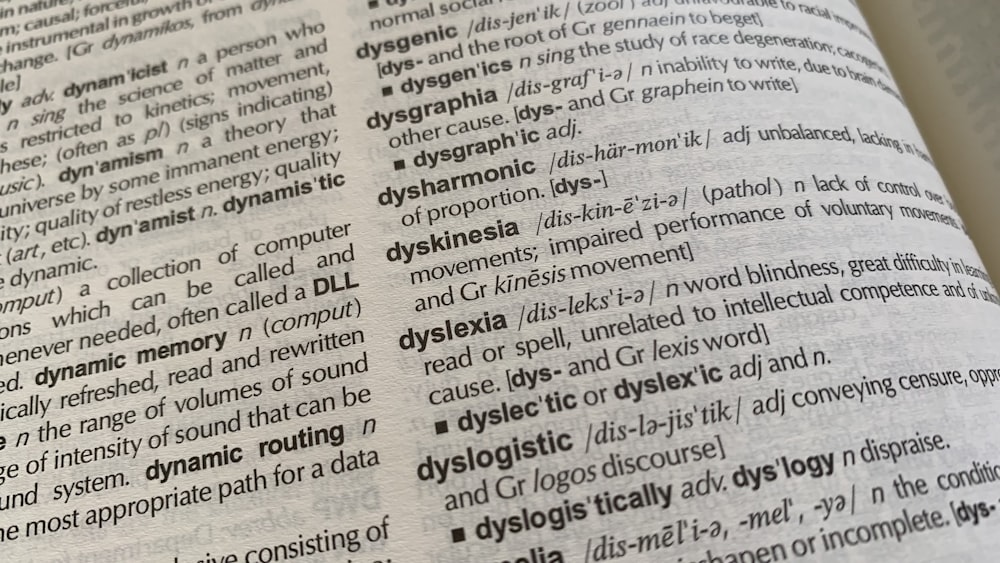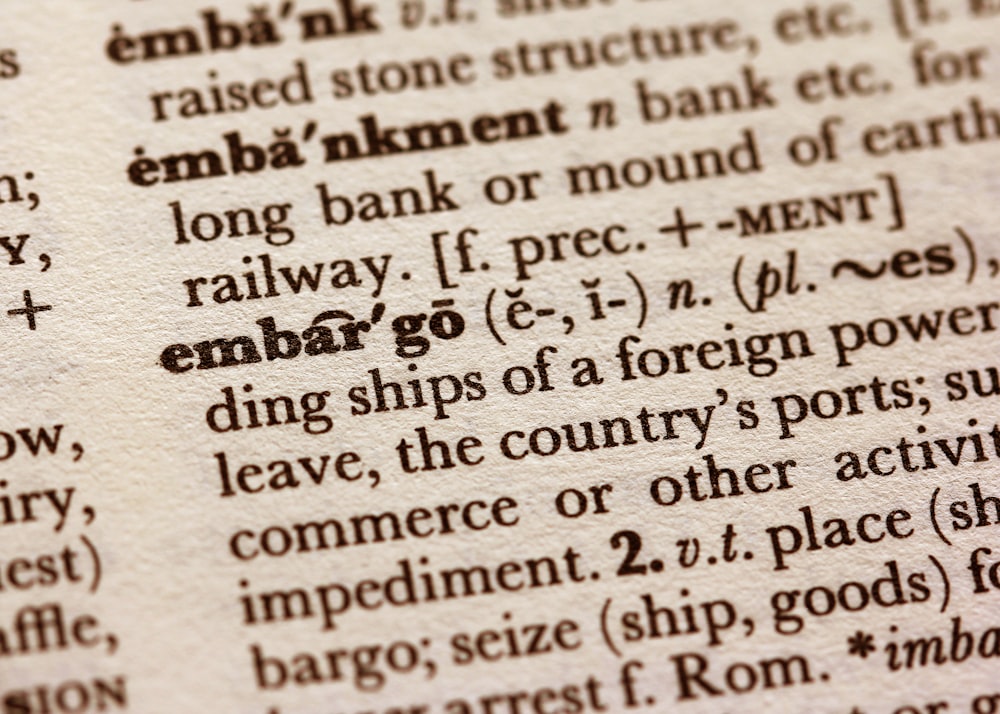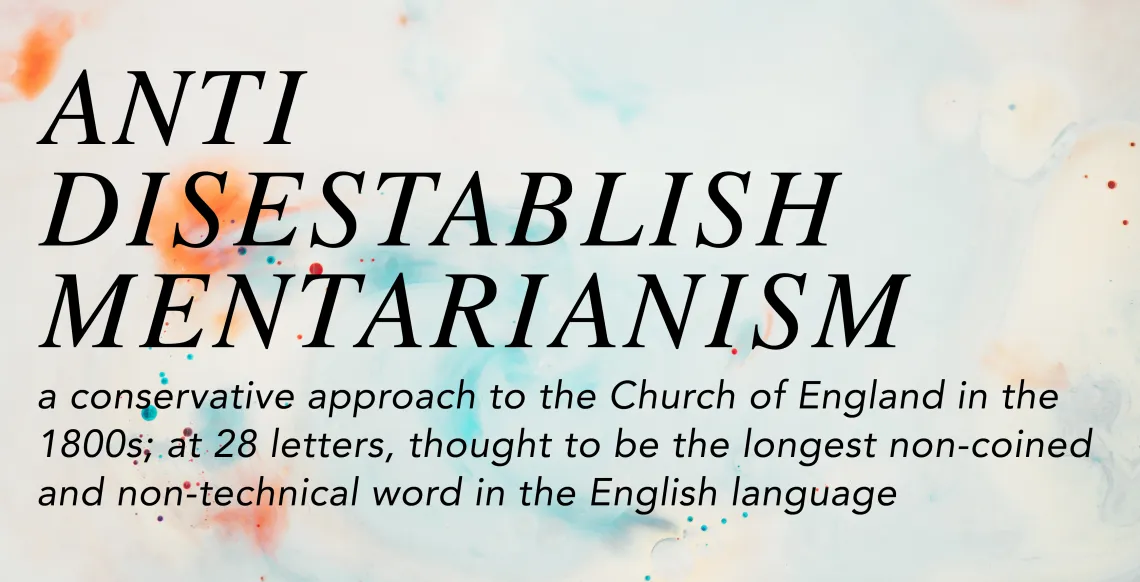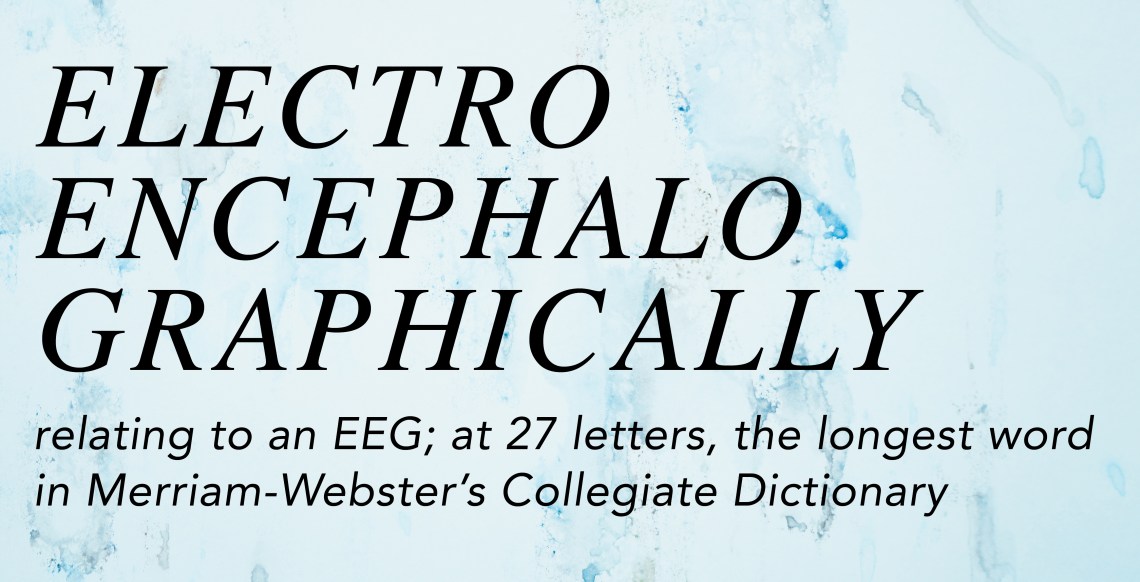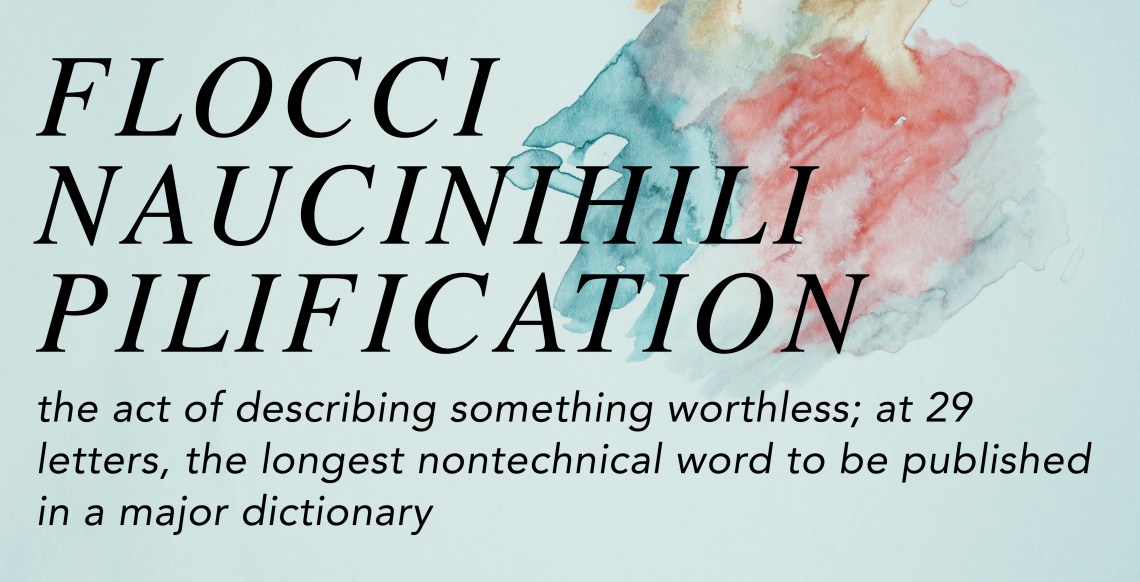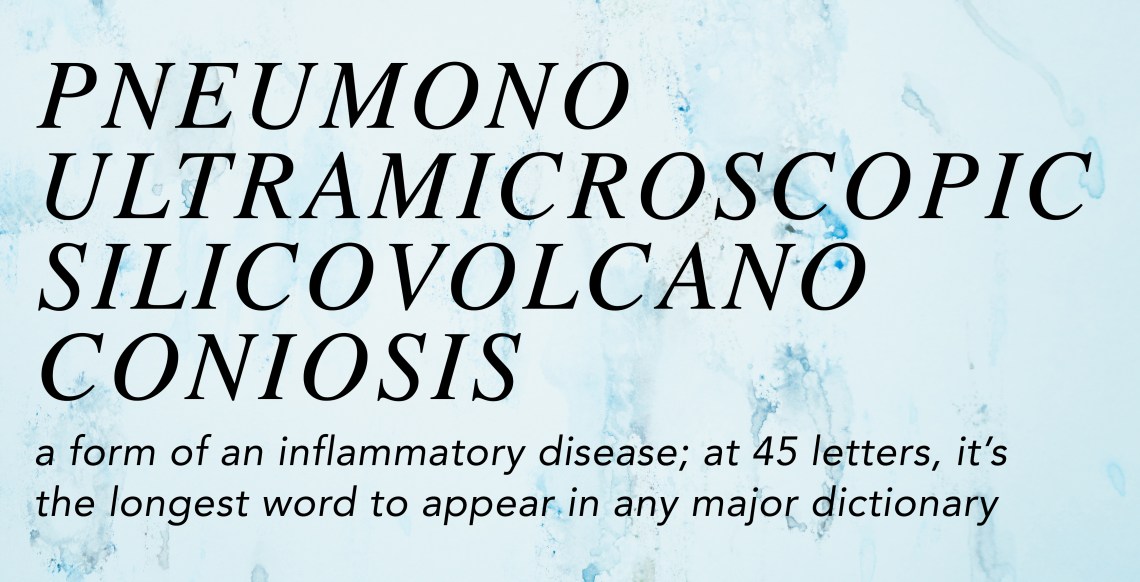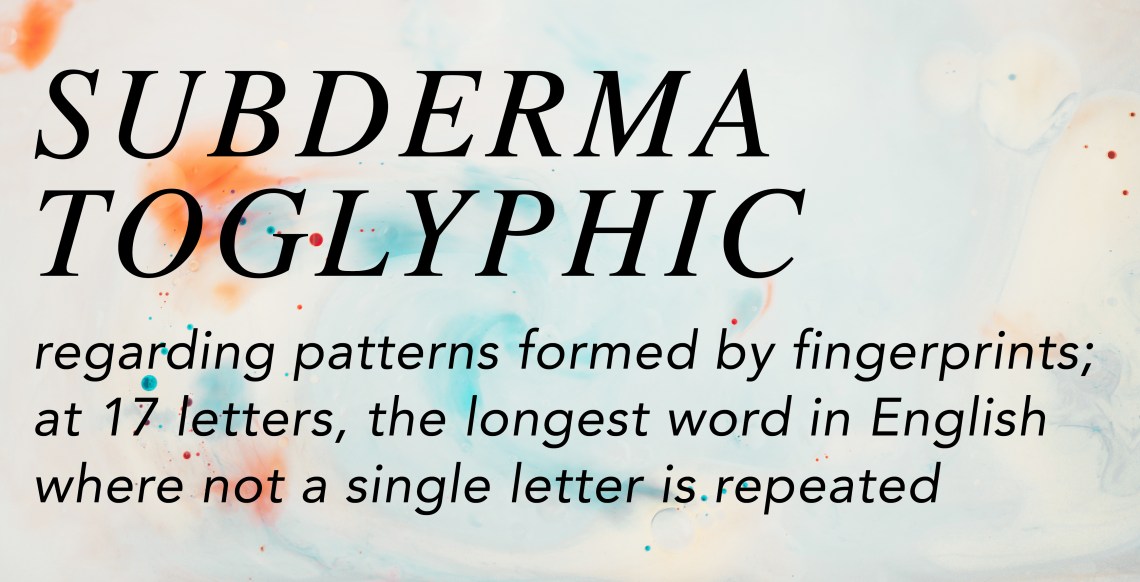From Wikipedia, the free encyclopedia
The identity of the longest word in English depends on the definition of a word and of length.
Words may be derived naturally from the language’s roots or formed by coinage and construction. Additionally, comparisons are complicated because place names may be considered words, technical terms may be arbitrarily long, and the addition of suffixes and prefixes may extend the length of words to create grammatically correct but unused or novel words.
The length of a word may also be understood in multiple ways. Most commonly, length is based on orthography (conventional spelling rules) and counting the number of written letters. Alternate, but less common, approaches include phonology (the spoken language) and the number of phonemes (sounds).
| Word | Letters | Meaning | Claim | Dispute |
|---|---|---|---|---|
| methionylthreonylthreonylglutaminylalanyl…isoleucine | 189,819 | The chemical composition of titin, the largest known protein | Longest known word overall by magnitudes. Attempts to say the entire word have taken two[1] to three and a half hours.[2] | Technical; not in dictionary; whether this should actually be considered a word is disputed |
| methionylglutaminylarginyltyrosylglutamyl…serine | 1,909 | The chemical name of E. coli TrpA (P0A877) | Longest published word[3] | Technical |
| lopadotemachoselachogaleokranioleipsano…pterygon | 183 | A fictional dish of food | Longest word coined by a major author,[4] the longest word ever to appear in literature[5] | Contrived nonce word; not in dictionary; Ancient Greek transliteration |
| pneumonoultramicroscopicsilicovolcanoconiosis | 45 | The disease silicosis | Longest word in a major dictionary[6] | Contrived coinage to make it the longest word; technical, but only mentioned and never actually used in communication |
| supercalifragilisticexpialidocious | 34 | Unclear in source work, has been cited as a nonsense word | Made popular in the Mary Poppins film and musical[7] | Contrived coinage |
| pseudopseudohypoparathyroidism | 30 | A hereditary medical disorder | Longest non-contrived word in a major dictionary[8] | Technical |
| antidisestablishmentarianism | 28 | The political position of opposing disestablishment | Longest non-contrived and nontechnical word[9] | Not all dictionaries accept it due to lack of usage.[10] |
| honorificabilitudinitatibus | 27 | The state of being able to achieve honors | Longest word in Shakespeare’s works; longest word in the English language featuring alternating consonants and vowels[11] | Latin |
Major dictionaries
The longest word in any of the major English language dictionaries is pneumonoultramicroscopicsilicovolcanoconiosis (45 letters), a word that refers to a lung disease contracted from the inhalation of very fine silica particles,[12] specifically from a volcano; medically, it is the same as silicosis. The word was deliberately coined to be the longest word in English, and has since been used[citation needed] in a close approximation of its originally intended meaning, lending at least some degree of validity to its claim.[6]
The Oxford English Dictionary contains pseudopseudohypoparathyroidism (30 letters).
Merriam-Webster’s Collegiate Dictionary does not contain antidisestablishmentarianism (28 letters), as the editors found no widespread, sustained usage of the word in its original meaning. The longest word in that dictionary is electroencephalographically (27 letters).[13]
The longest non-technical word in major dictionaries is floccinaucinihilipilification at 29 letters. Consisting of a series of Latin words meaning «nothing» and defined as «the act of estimating something as worthless»; its usage has been recorded as far back as 1741.[14][15][16]
Ross Eckler has noted that most of the longest English words are not likely to occur in general text, meaning non-technical present-day text seen by casual readers, in which the author did not specifically intend to use an unusually long word. According to Eckler, the longest words likely to be encountered in general text are deinstitutionalization and counterrevolutionaries, with 22 letters each.[17]
A computer study of over a million samples of normal English prose found that the longest word one is likely to encounter on an everyday basis is uncharacteristically, at 20 letters.[18]
The word internationalization is abbreviated «i18n», the embedded number representing the number of letters between the first and the last.[19][20][21]
Creations of long words
Coinages
In his play Assemblywomen (Ecclesiazousae), the ancient Greek comedic playwright Aristophanes created a word of 171 letters (183 in the transliteration below), which describes a dish by stringing together its ingredients:
Henry Carey’s farce Chrononhotonthologos (1743) holds the opening line: «Aldiborontiphoscophornio! Where left you Chrononhotonthologos?»
Thomas Love Peacock put these creations into the mouth of the phrenologist Mr. Cranium in his 1816 book Headlong Hall: osteosarchaematosplanchnochondroneuromuelous (44 characters) and osseocarnisanguineoviscericartilaginonervomedullary (51 characters).
James Joyce made up nine 100-letter words plus one 101-letter word in his novel Finnegans Wake, the most famous of which is Bababadalgharaghtakamminarronnkonnbronntonnerronntuonnthunntrovarrhounawnskawntoohoohoordenenthurnuk. Appearing on the first page, it allegedly represents the symbolic thunderclap associated with the fall of Adam and Eve. As it appears nowhere else except in reference to this passage, it is generally not accepted as a real word. Sylvia Plath made mention of it in her semi-autobiographical novel The Bell Jar, when the protagonist was reading Finnegans Wake.
«Supercalifragilisticexpialidocious», the 34-letter title of a song from the movie Mary Poppins, does appear in several dictionaries, but only as a proper noun defined in reference to the song title. The attributed meaning is «a word that you say when you don’t know what to say.» The idea and invention of the word is credited to songwriters Robert and Richard Sherman.
Agglutinative constructions
The English language permits the legitimate extension of existing words to serve new purposes by the addition of prefixes and suffixes. This is sometimes referred to as agglutinative construction. This process can create arbitrarily long words: for example, the prefixes pseudo (false, spurious) and anti (against, opposed to) can be added as many times as desired. More familiarly, the addition of numerous «great»s to a relative, such as «great-great-great-great-grandparent», can produce words of arbitrary length. In musical notation, an 8192nd note may be called a semihemidemisemihemidemisemihemidemisemiquaver.
Antidisestablishmentarianism is the longest common example of a word formed by agglutinative construction.
Technical terms
A number of scientific naming schemes can be used to generate arbitrarily long words.
The IUPAC nomenclature for organic chemical compounds is open-ended, giving rise to the 189,819-letter chemical name Methionylthreonylthreonyl…isoleucine for the protein also known as titin, which is involved in striated muscle formation. In nature, DNA molecules can be much bigger than protein molecules and therefore potentially be referred to with much longer chemical names. For example, the wheat chromosome 3B contains almost 1 billion base pairs,[22] so the sequence of one of its strands, if written out in full like Adenilyladenilylguanilylcystidylthymidyl…, would be about 8 billion letters long. The longest published word, Acetylseryltyrosylseryliso…serine, referring to the coat protein of a certain strain of tobacco mosaic virus (P03575), is 1,185 letters long, and appeared in the American Chemical Society’s Chemical Abstracts Service in 1964 and 1966.[23] In 1965, the Chemical Abstracts Service overhauled its naming system and started discouraging excessively long names. In 2011, a dictionary broke this record with a 1909-letter word describing the trpA protein (P0A877).[3]
John Horton Conway and Landon Curt Noll developed an open-ended system for naming powers of 10, in which one sexmilliaquingentsexagintillion, coming from the Latin name for 6560, is the name for 103(6560+1) = 1019683. Under the long number scale, it would be 106(6560) = 1039360.
Gammaracanthuskytodermogammarus loricatobaicalensis is sometimes cited as the longest binomial name—it is a kind of amphipod. However, this name, proposed by B. Dybowski, was invalidated by the International Code of Zoological Nomenclature in 1929 after being petitioned by Mary J. Rathbun to take up the case.[24]
Myxococcus llanfairpwllgwyngyllgogerychwyrndrobwllllantysiliogogogochensis is the longest accepted binomial name for an organism. It is a bacterium found in soil collected at Llanfairpwllgwyngyll (discussed below). Parastratiosphecomyia stratiosphecomyioides is the longest accepted binomial name for any animal, or any organism visible with the naked eye. It is a species of soldier fly.[25] The genus name Parapropalaehoplophorus (a fossil glyptodont, an extinct family of mammals related to armadillos) is two letters longer, but does not contain a similarly long species name.
Aequeosalinocalcalinoceraceoaluminosocupreovitriolic, at 52 letters, describing the spa waters at Bath, England, is attributed to Dr. Edward Strother (1675–1737).[26] The word is composed of the following elements:
- Aequeo: equal (Latin, aequo[27])
- Salino: containing salt (Latin, salinus)
- Calcalino: calcium (Latin, calx)
- Ceraceo: waxy (Latin, cera)
- Aluminoso: alumina (Latin)
- Cupreo: from «copper»
- Vitriolic: resembling vitriol
Notable long words
Place names
The longest officially recognized place name in an English-speaking country is Taumatawhakatangihangakoauauotamateaturipukakapikimaungahoronukupokaiwhenuakitanatahu (85 letters), which is a hill in New Zealand. The name is in the Māori language. A widely recognized version of the name is Taumatawhakatangihangakoauauotamateaturipukakapikimaungahoronukupokaiwhenuakitanatahu (85 letters), which appears on the signpost at the location (see the photo on this page). In Māori, the digraphs ng and wh are each treated as single letters.
In Canada, the longest place name is Dysart, Dudley, Harcourt, Guilford, Harburn, Bruton, Havelock, Eyre and Clyde, a township in Ontario, at 61 letters or 68 non-space characters.[28]
The 58-letter name Llanfairpwllgwyngyllgogerychwyrndrobwllllantysiliogogogoch is the name of a town on Anglesey, an island of Wales. In terms of the traditional Welsh alphabet, the name is only 51 letters long, as certain digraphs in Welsh are considered as single letters, for instance ll, ng and ch. It is generally agreed, however, that this invented name, adopted in the mid-19th century, was contrived solely to be the longest name of any town in Britain. The official name of the place is Llanfairpwllgwyngyll, commonly abbreviated to Llanfairpwll or Llanfair PG.
The longest non-contrived place name in the United Kingdom which is a single non-hyphenated word is Cottonshopeburnfoot (19 letters) and the longest which is hyphenated is Sutton-under-Whitestonecliffe (29 characters).
The longest place name in the United States (45 letters) is Chargoggagoggmanchauggagoggchaubunagungamaugg, a lake in Webster, Massachusetts. It means «Fishing Place at the Boundaries – Neutral Meeting Grounds» and is sometimes facetiously translated as «you fish your side of the water, I fish my side of the water, nobody fishes the middle». The lake is also known as Webster Lake.[29] The longest hyphenated names in the U.S. are Winchester-on-the-Severn, a town in Maryland, and Washington-on-the-Brazos, a notable place in Texas history. The longest single-word town names in the U.S. are Kleinfeltersville, Pennsylvania and Mooselookmeguntic, Maine.
The longest official geographical name in Australia is Mamungkukumpurangkuntjunya.[30] It has 26 letters and is a Pitjantjatjara word meaning «where the Devil urinates».[31]
Liechtenstein is the longest country name with single name in English. The second longest country name with single name in English is Turkmenistan. There are longer country names if one includes ones with spaces.
Personal names
Guinness World Records formerly contained a category for longest personal name used.
- From about 1975 to 1985, the recordholder was Adolph Blaine Charles David Earl Frederick Gerald Hubert Irvin John Kenneth Lloyd Martin Nero Oliver Paul Quincy Randolph Sherman Thomas Uncas Victor William Xerxes Yancy Zeus Wolfeschlegelsteinhausenbergerdorffvoralternwarengewissenhaftschaferswessenschafewarenwohlgepflegeundsorgfaltigkeitbeschutzenvonangreifendurchihrraubgierigfeindewelchevoralternzwolftausendjahresvorandieerscheinenwanderersteerdemenschderraumschiffgebrauchlichtalsseinursprungvonkraftgestartseinlangefahrthinzwischensternartigraumaufdersuchenachdiesternwelchegehabtbewohnbarplanetenkreisedrehensichundwohinderneurassevonverstandigmenschlichkeitkonntefortplanzenundsicherfreuenanlebenslanglichfreudeundruhemitnichteinfurchtvorangreifenvonandererintelligentgeschopfsvonhinzwischensternartigraum, Senior (746 letters), also known as Wolfe+585, Senior.
- After 1985 Guinness briefly awarded the record to a newborn girl with a longer name. The category was removed shortly afterward.
Long birth names are often coined in protest of naming laws or for other personal reasons.
- The naming law in Sweden was challenged by parents Lasse Diding and Elisabeth Hallin, who proposed the given name «Brfxxccxxmnpcccclllmmnprxvclmnckssqlbb11116» for their child (pronounced [ˈǎlːbɪn], 43 characters), which was rejected by a district court in Halmstad, southern Sweden.
Words with certain characteristics of notable length
- Schmaltzed and strengthed (10 letters) appear to be the longest monosyllabic words recorded in The Oxford English Dictionary, while scraunched and scroonched appear to be the longest monosyllabic words recorded in Webster’s Third New International Dictionary; but squirrelled (11 letters) is the longest if pronounced as one syllable only (as permitted in The Shorter Oxford English Dictionary and Merriam-Webster Online Dictionary at squirrel, and in Longman Pronunciation Dictionary). Schtroumpfed (12 letters) was coined by Umberto Eco, while broughammed (11 letters) was coined by William Harmon after broughamed (10 letters) was coined by George Bernard Shaw.
- Strengths is the longest word in the English language containing only one vowel letter.[32]
- Euouae, a medieval musical term, is the longest English word consisting only of vowels, and the word with the most consecutive vowels. However, the «word» itself is simply a mnemonic consisting of the vowels to be sung in the phrase «seculorum Amen» at the end of the lesser doxology. (Although u was often used interchangeably with v, and the variant «Evovae» is occasionally used, the v in these cases would still be a vowel.)
- The longest words with no repeated letters are dermatoglyphics and uncopyrightable.[33]
- The longest word whose letters are in alphabetical order is the eight-letter Aegilops, a grass genus. However, this is arguably a proper noun. There are several six-letter English words with their letters in alphabetical order, including abhors, almost, begins, biopsy, chimps and chintz.[34] There are few 7-letter words, such as «billowy» and «beefily». The longest words whose letters are in reverse alphabetical order are sponged, wronged and trollied.
- The longest words recorded in OED with each vowel only once, and in order, are abstemiously, affectiously, and tragediously (OED). Fracedinously and gravedinously (constructed from adjectives in OED) have thirteen letters; Gadspreciously, constructed from Gadsprecious (in OED), has fourteen letters. Facetiously is among the few other words directly attested in OED with single occurrences of all six vowels (counting y as a vowel).
- The longest single palindromic word in English is rotavator, another name for a rotary tiller for breaking and aerating soil.
Typed words
- The longest words typable with only the left hand using conventional hand placement on a QWERTY keyboard are tesseradecades, aftercataracts, dereverberated, dereverberates[35] and the more common but sometimes hyphenated sweaterdresses.[34] Using the right hand alone, the longest word that can be typed is johnny-jump-up, or, excluding hyphens, monimolimnion[36] and phyllophyllin.
- The longest English word typable using only the top row of letters has 11 letters: rupturewort. The word teetertotter (used in North American English) is longer at 12 letters, although it is usually spelled with a hyphen.
- The longest using only the middle row is shakalshas (10 letters). Nine-letter words include flagfalls; eight-letter words include galahads and alfalfas.
- Since the bottom row contains no vowels, no standard words can be formed. [37]
- The longest words typable by alternating left and right hands are antiskepticism and leucocytozoans respectively.[34]
- On a Dvorak keyboard, the longest «left-handed» words are epopoeia, jipijapa, peekapoo, and quiaquia.[38] Other such long words are papaya, Kikuyu, opaque, and upkeep.[39] Kikuyu is typed entirely with the index finger, and so the longest one-fingered word on the Dvorak keyboard. There are no vowels on the right-hand side, and so the longest «right-handed» word is crwths.
See also
- Lipogram
- List of long species names
- List of the longest English words with one syllable
- Longest English sentence
- Longest word in French
- Longest word in Romanian
- Longest word in Spanish
- Longest word in Turkish
- Number of words in English
- Scriptio continua
- Sesquipedalianism
- Donaudampfschiffahrtselektrizitätenhauptbetriebswerkbauunterbeamtengesellschaft, longest published word in German
References
- ^ «Reading The Longest English Word (190,000 Characters)». YouTube. Archived from the original on 2021-11-10. Retrieved 2 August 2020.
- ^ «World’s longest word takes 3.5 hours to pronounce». CW39 Houston. 2012-12-08. Retrieved 2020-05-18.
- ^ a b Colista Moore (2011). Student’s Dictionary. p. 524. ISBN 978-1-934669-21-1.
- ^ see separate article Lopado…pterygon
- ^ Donald McFarlan; Norris Dewar McWhirter; David A. Boeh (1989). Guinness book of world records: 1990. Sterling. p. 129. ISBN 978-0-8069-5790-6.
- ^ a b Coined around 1935 to be the longest word; press reports on puzzle league members legitimized it somewhat. First appeared in the MWNID supplement, 1939. Today OED and several others list it, but citations are almost always as «longest word». More detail at pneumonoultramicroscopicsilicovolcanoconiosis.
- ^ «Merriam Webster: Supercalifragilisticexpialidocious».
- ^ «What is the longest English word?». AskOxford. Archived from the original on 2008-10-22. Retrieved 2010-08-22.
- ^ «What is the longest English word?». oxforddictionaries.com.[dead link]
- ^ «Merriam Webster: «Antidisestablishmentarianism is not in the dictionary.»«.
- ^ «Cool, Strange, and Interesting Facts,» fact 99. InnocentEnglish.com. Retrieved 2019-03-13.
- ^ «pneumonoultramicroscopicsilicovolcanoconiosis – definition of pneumonoultramicroscopicsilicovolcanoconiosis in English from the Oxford dictionary». oxforddictionaries.com. Archived from the original on 2012-07-19.
- ^ «The Longest Word in the Dictionary» (Video). Ask the Editor. Merriam-Webster. Archived from the original on 21 November 2013. Retrieved 14 November 2013.
- ^ «Floccinaucinihilipilification» by Michael Quinion World Wide Words Archived 2006-08-21 at the Wayback Machine;
- ^ The Guinness Book of Records, in its 1992 and previous editions, declared the longest real word in the English language to be floccinaucinihilipilification. More recent editions of the book have acknowledged pneumonoultramicroscopicsilicovolcanoconiosis. What is the longest English word? — Oxford Dictionaries Online Archived 2006-08-26 at the Wayback Machine
- ^ In recent times its usage has been recorded in the proceedings of the United States Senate by Senator Robert Byrd Discussion between Sen. Moynihan and Sen. Byrd «Mr. President, may I say to the distinguished Senator from New York, I used that word on the Senate floor myself 2 or 3 years ago. I cannot remember just when or what the occasion was, but I used it on that occasion to indicate that whatever it was I was discussing it was something like a mere trifle or nothing really being of moment.» Congressional Record June 17, 1991, p. S7887, and at the White House by Bill Clinton’s press secretary Mike McCurry, albeit sarcastically. December 6, 1995, White House Press Briefing in discussing Congressional Budget Office estimates and assumptions: «But if you – as a practical matter of estimating the economy, the difference is not great. There’s a little bit of floccinaucinihilipilification going on here.»
- ^ Eckler, R. Making the Alphabet Dance, p 252, 1996.
- ^ «Longest Common Words – Modern». Maltron.com. Archived from the original on 27 April 2009. Retrieved 2010-08-22.
- ^ «Glossary of W3C Jargon». World Wide Web Consortium. Archived from the original on 2008-10-25. Retrieved 2008-10-13.
- ^ «Origin of the Abbreviation I18n». Archived from the original on 2014-06-27.
- ^ «Localization vs. Internationalization». World Wide Web Consortium. Archived from the original on 2016-04-03.
- ^ Paux et al. (2008) Science, Vol. 322 (5898) 101-104. A Physical Map of the 1-Gigabase Bread Wheat Chromosome 3B Paux, Etienne; Sourdille, Pierre; Salse, Jérôme; Saintenac, Cyrille; Choulet, Frédéric; Leroy, Philippe; Korol, Abraham; Michalak, Monika; Kianian, Shahryar; Spielmeyer, Wolfgang; Lagudah, Evans; Somers, Daryl; Kilian, Andrzej; Alaux, Michael; Vautrin, Sonia; Bergès, Hélène; Eversole, Kellye; Appels, Rudi; Safar, Jan; Simkova, Hana; Dolezel, Jaroslav; Bernard, Michel; Feuillet, Catherine (2008). «A Physical Map of the 1-Gigabase Bread Wheat Chromosome 3B». Science. 322 (5898): 101–104. Bibcode:2008Sci…322..101P. doi:10.1126/science.1161847. PMID 18832645. S2CID 27686615. Archived from the original on 2015-09-03. Retrieved 2012-12-01.
- ^ Chemical Abstracts Formula Index, Jan.-June 1964, Page 967F; Chemical Abstracts 7th Coll. Formulas, C23H32-Z, 56-65, 1962–1966, Page 6717F
- ^ «Opinion 105. Dybowski’s (1926) Names of Crustacea Suppressed». Opinions Rendered by the International Commission on Zoological Nomenclature: Opinions 105 to 114. Smithsonian Miscellaneous Collections. Vol. 73. 1929. pp. 1–3. hdl:10088/23619. BHL page 8911139.
- ^ rjk. «World’s longest name of an animal. Parastratiosphecomyia stratiosphecomyioides Stratiomyid Fly Soldier Fly». thelongestlistofthelongeststuffatthelongestdomainnameatlonglast.com. Archived from the original on 2011-11-17. Retrieved 2011-12-17.
- ^ cited in some editions of the Guinness Book of Records as the longest word in English, see Askoxford.com on the longest English word
- ^ [1][dead link]
- ^ «GeoNames Government of Canada site». Archived from the original on 2009-02-06.
- ^ Belluck, Pam (2004-11-20). «What’s the Name of That Lake? It’s Hard to Say». The New York Times.
- ^ «Geoscience Australia Gazetteer». Archived from the original on 2007-10-01.
- ^ «South Australian State Gazetteer». Archived from the original on 2007-10-01.
- ^ «Guinness Records».
- ^ «Longest Word Without Repeating Letters». December 2014.
- ^ a b c «Typewriter Words». Questrel.com. Archived from the original on 2010-09-27. Retrieved 2010-08-22.
- ^ «Science Links Japan | Two Unique Aftercataracts Requiring Surgical Removal». Sciencelinks.jp. 2009-03-18. Archived from the original on 2011-02-17. Retrieved 2010-08-22.
- ^ «Dictionary entry for monimolimnion, a word that, at 13 letters, is longer than any of the words linked in the source above». Archived from the original on 2009-09-09. Retrieved 2009-08-15.
- ^ «Word Records». Fun-with-words.com. Archived from the original on 2012-08-26. Retrieved 2012-08-13.
- ^ «Typewriter Words». Wordnik.com. Archived from the original on 2011-07-17. Retrieved 2011-01-15.
- ^ «The Dvorak Keyboard and You». Theworldofstuff.com. Archived from the original on 2010-08-20. Retrieved 2010-08-22.
External links
This audio file was created from a revision of this article dated 8 January 2011, and does not reflect subsequent edits.
- A Collection of Word Oddities and Trivia – Long words
- Long words (chemical names)
- Long words (place names)
- What is the longest English word?, AskOxford.com «Ask the Experts»
- What is the Longest Word?, Fun-With-Words.com
- Full chemical name of titin.
- Taxonomy of Wordplay
Ready to take your Scrabble skills to the next level? This list of the longest words in the English language could score you major points on your next game — if you can remember how to spell them.
Some of the words that qualify for the title take hours to pronounce, like the 189,819-letter word for the protein Titin. Additionally, many of the longest words are medical terms, so we have excluded some of them to allow for more variety. The end result is a list of fascinatingly lengthy words that will make your vocabulary downright sesquipedalian.
Antidisestablishmentarianism
Part of Speech: noun
Definition: opposition to the disestablishment of the Church of England
Origins: While the word originated in 19th century Britain, it is now used to refer to any opposition to a government withdrawing support from a religious organization. Though rarely used in casual conversation, the word was featured in the Duke Ellington song, “You’re Just an Old Antidisestablishmentarianist.”
Floccinaucinihilipilification
Part of Speech: noun
Definition: the act of defining or estimating something as worthless
Origins: This word stems from the combination of four Latin words, all of which signify that something has little value: flocci, nauci, nihili, pilifi. This style of word creation was popular in Britain in the 1700s.
Pneumonoultramicroscopicsilicovolcanoconiosis
Part of Speech: noun
Definition: an invented word said to mean a lung disease caused by inhaling a fine dust
Origins: This word emerged in the late 1930s, and was said to be invented by Everett K. Smith, president of the National Puzzlers’ League, in an imitation of very long medical terms. It is not found in real medical usage.
Pseudopseudohypoparathyroidism
Part of Speech: noun
Definition: an inherited disorder similar to pseudohypoparathyroidism
Origins: This genetic disorder causes “short stature, round face and short hand bones,” according to the National Institutes of Health. Despite having a similar name, it is not the same as pseudohypoparathyroidism.
Psychoneuroendocrinological
Part of Speech: adjective
Definition: of or related to to the branch of science concerned with the relationships between psychology, the nervous system, and the endocrine system
Origins: This term was first seen in the 1970s in Journal of Neurological Science, a medical journal.
Sesquipedalian
Part of Speech: adjective
Definition: having many syllables or characterized by the use of long words
Origins: The Roman poet Horace used this term to caution young poets against relying on words that used a large number of letters. It was adopted in the 17th century by poets to ridicule their peers who used lengthy words.
Hippopotomonstrosesquippedaliophobia
Part of Speech: noun
Definition: fear of long words
Fun Fact: This word is most often used in humorous contexts. It is an extension of the word sesquipedalophobia, which has the same meaning and is more often used in a formal context.
Incomprehensibilities
Part of Speech: noun
Definition: things that are impossible to understand or comprehend
Fun Fact: In the 1990s, this word was named the longest word in common usage.
Uncopyrightable
Part of Speech: adjective
Definition: not able or allowed to be protected by copyright
Fun Fact: This word is one of the longest isograms (a word that does not repeat letters) in the English language.
Dermatoglyphics
Part of Speech: noun
Definition: the scientific study of hands, including fingerprints, lines, mounts, and shapes
Fun Fact: Unlike palmistry, this study is based in science and is often used in criminology as a way to identify both perpetrators and victims.
Euouae
Part of Speech: noun
Definition: a type of cadence in medieval music
Fun Fact: While this word might not look as impressive as others on this list, it’s the longest word in the English language to be composed entirely of vowels. (It’s also the word with the longest string of vowels.)
Psychophysicotherapeutics
Part of Speech: noun
Definition: a therapeutic approach that integrates both the mind and body
Fun Fact: While the Oxford Dictionary does not provide an official definition of this word, it is included on their list of the longest words in the English language.
Otorhinolaryngological
Part of Speech: adjective
Definition: of or relating to the medical specialization involving the ear, nose, and throat
Fun Fact: This medical specialization is more commonly known by its acronym, ENT.
According to the 20th volume of the Oxford English Dictionary, there are a total of 171,476 words in current use. With this number of words, your mind will begin to imagine which words are the longest and how many letters they have. Well, you needn’t wonder anymore, this article has got you covered.
A very high percentage of the longest words in English are medicine and chemistry terminologies. However, you will not find some of them in the dictionary as space is an essential constraint of a dictionary.
For example, the longest word in the English language is METHIONYLTHREONYLTHREONYGLUTAMINYLARGINYL…ISOLEUCINE which is the full chemical name for the human protein titin. The word has 189,819 letters, taking about three-and-a-half hours to pronounce. The problem with including chemical names in the dictionary is that there is no limit to how long it can be.
In the same light, the longest word to ever appear in the literature is from Assemblywomen, a play by Aristophanes published in 391 BC. LOPADOTEMACHOSELACHOGALEOKRANIOLEIPSAN…PTERYGON is a Greek word that has a total of 171 letters that translates to 183.
However, this article is focused on the longest English words in the dictionary. There are several lengthy words in the dictionary. Continue reading to appreciate a few of them.

The forty-five-letter word is a noun that refers to a lung disease caused by the inhalation of silica, quartz dust, very fine ash or sand dust found in volcanoes.
Pneumonoultramicroscopicsilicovolcanoconiosis was invented in the 1930s during the annual meeting of the National Puzzlers’ League (N.P.L.) by Everett M. Smith (the president). The word was coined in imitation of very long medical terms. The 45-letter word is a synonym for the disease known as silicosis.
Additionally, it first appeared in the supplement to the Merriam-Webster New International Dictionary in the year 1939.
The second position on the list is Hippopotomonstrosesquippedaliophobia, with a total of thirty-six letters. Plus, it has 15 syllables which divides into hip-po-pot-o-mon-stro-ses-quip-ped-al-i-o-pho-bi-a.
Hippopotomonstrosesquippedaliophobia is a noun that refers to the fear of long words. Isn’t it ironic that the word that means the fear of long words is actually one of the longest words in the dictionary?
Additionally, the prefix hippopoto- and monstro- which alludes to hippopotamus and monsters, were only added to the word to blow the word out of proportion. You don’t necessarily need them for the meaning. The word’s true meaning comes for the Latin word sesquipedalis, which means a foot and a half long and the word phobia, meaning an irrational fear.

The thirty-four-letter word is an adjective that means extraordinarily good or wonderful. However, the oxford dictionary defines the word as a nonsense word typically used by children to express excited approbation.
If you ever watched Mary Poppins (the 1964 film) as a child, you might remember supercalifragilisticexpialidocious as first used by Mary Poppins. Mary Poppins described it as a word to use when you have nothing to say.
This is the fourth-longest word in the dictionary, and the longest non-coined word in the English language with a total of thirty letters is pseudopseudohypoparathyroidism. The thirty-letter word has 11 syllables, which divide into Pseu-do-pseu-do-hy-po-pa-ra-thy-roid-ism.
Pseudopseudohypoparathyroidism, which is often abbreviated as PPHP, is a noun that refers to the condition that causes the soft tissues and joints in the body to harden, leading to a round face, short stature and short hand bones. This condition is often inherited
Pseudo means false or fake. The word consists of the word pseudo twice because the disorder stimulates the peculiar symptoms of pseudohypoparathyroidism, whereby the body does not respond to the parathyroid hormone. This shows two-level of faking it or falseness going on.
The fifth on the list is Floccinaucinihilipilification coming with a total of twenty-nine letters. Floccinaucinihilipilification has 12 syllables which divides into floc-ci-nau-ci-ni-hil-i-pil-i-fi-ca-tion.
Floccinaucinihilipilification is a noun that refers to the action or habit of estimating something as worthless or valueless. It is mostly never used except in a list of the longest words in the English language. However, when it is used, it is often in reference to itself.
The twenty-nine letter word dates back to the mid-18th century having Latin roots. It is made up of the Latin words flocci, nauci, nihili, and pili, which means little value. The first recorded use of Floccinaucinihilipilification was in a letter by William Shenstone in 1741.

Antidisestablishmentarianism originally referred to the opposition of the Church of England’s disestablishment and the advocacy that the church should continue to receive government patronage. However, it is now being used to describe any opposition to withdrawing government support from religions or churches.
Also, in 1838, Antidisestablishmentarianism was first said by Weekley. The word was first recorded in Gladstone’s “Church and State. Furthermore, the twenty-eight-letter word, a prime example of a sesquipedalian word, is never really used today and was rarely used after it was formed.
Honorificabilitudinitatibus is the longest word in the dictionary that features only alternating consonants and vowels with 27 letters. Also, it has a total of 11 syllables, which divides into Hon-ori-fi-ca-bi-li-tu-dini-tat-i-bus.
Honorificabilitudinitatibus is a noun that means the state of being able to achieve honours. Also, it is the ablative and dative plural of the Latin word honorificabilitudinitas. The twenty-seven letters only appeared only once in Shakespeare’s works (Love’s Labour’s Lost).
Coming eighth on the list is incomprehensibilities with a total of twenty-one letters. The pronunciation of Incomprehensibilities comes in 8 syllables, which divides into in-com-pri-hen-si-bi-li-ties.
Incomprehensibilities is a noun that refers to the things that are impossible to understand or comprehend; it could also mean unintelligible.
The word was derived in Middle English from the Latin word incomprehēnsibilis; it was first recorded sometime in the early 1300s. Also, during the 1990s, the word was named the longest word in common usage.
With 20 letters words, the next letter is uncharacteristically. The pronunciation of the word comes in 8 syllables, which divides into un-char-ac-ter-is-ti-ca-lly.
Uncharacteristically, it is an adverb that means performing an action in a way that is not typical for a person or thing. The first known use of uncharacteristically was in 1748.
Isograms are words that have no repeated letters in their spellings; there are several isograms in the English dictionary. The longest isogram is subdermatoglyphic, with a total of 17 letters. However, subdermatoglyphic is not included in the dictionary; that is why it is not part of this list.
On the other hand, the next longest isogram is uncopyrightable, which is a word included in the English dictionary, has a total of 15 letters. Plus, it has six syllables that break down into un-co-py-righ-ta-ble.
Uncopyrightable is an adjective that means not allowed to or not able to be protected by copyright, the first known use of the word was in 1926.
Прежде чем вы начнете читать статью, ответьте на вопрос: Сколько букв в самом длинном слове английского языка? 50? 75? 100? 220? В любом случае, запомните эту цифру.
Трудно поверить, но в самом коротком длинном слове в английском языке «всего» 27(!) букв. Мы начнем с самого короткого слова, а закончим самым длинным:
1. Honorificabilitudinitatibus

2. Antidisestablishmentarianism
Это слово (28 букв!) вы найдете в словаре, и переводится оно следующим образом – движение за не разделение государства и церкви. Данное движение появилось в Англии в середине 1860-ых. Хотя слово и относится к устаревшим (архаичным) словам, оно встречается в научной (исторической) и художественной литературе.
3. Floccinaucinihilipilification
В этом слове 29 букв и состоит оно из корней латинских слов. Что оно означает? Вы его без труда найдете в словарях, а означает оно «опорочивание, дискредитация».
4. Pseudopseudohypoparathyroidism
В этом слове 30 букв. И обозначает оно один из типов генетического нарушения. Этот тип схож с тем, что в медицине называют псевдогипопаратиреоз, но при нем не наблюдается дефицит кальция. Не вдаваясь в медицинские детали, лучше не иметь у себя в организме то, что называется словом из 30 букв.
5. Supercalifragilisticexpialidocious

6. Pneumonoultramicroscopicsilicovolcanoconiosis
В этом медицинском термине 45 букв! И означает он заболевание легких, вызванное вдыханием пыли, содержащей свободную двуокись кремния. Это слово зафиксировано в словарях, но в медицинской практике пользуются очень коротким словом – silicosis (силикоз или силикатоз). Доктора, которые пишут в истории болезни такое длинное слово, очевидно, получают почасовую зарплату.
7. Aequeosalinocalcalinoceraceoaluminosocupreovitriolic

8. Lopadotemachoselachogaleokranioleipsanodrimhypotr
immatosilphioparaomelito-katakechymenokichlepikossyphophattoperisteralektryonoptekephalliokigklopeleiolagoio-siraiobaphetraganopterygon
В этом слове 171 буква, а авторство принадлежит древнегреческому автору Аристофану. В одной из комедий он приводит придуманное им самим блюдо. В основе – названия необычных ингредиентов: акулы, голуби, мед и всевозможные фрагменты тел животных, надо сказать, не всегда аппетитные.
В начале статьи мы попросили вас предположить, сколько букв в самом длинном слове английского языка. Какую цифру вы выбрали? Смеем предположить, что вы ошиблись. Потому что самое длинное английское слово —
9. Methionylglutaminylarginyltyrosylglutamylserylleucylphenyl—
alanylalanylglutaminylleucyllysylglutamylarginyllysylglutamyl—
glycylalanylphenylalanylvalylprolylphenylalanylvalylthreonyl—
leucylglycylaspartylprolylglycylisoleucylglutamylglutaminyl—
serylleucyllysylisoleucylaspartylthreonylleucylisoleucylglutamy—
lalanylglycylalanylaspartylalanylleucylglutamylleucylglycylisoleucyl—
prolylphenylalanylserylaspartylprolylleucylalanylaspartylglycylproly—
lthreonylisoleucylglutaminylaspfraginylalanylthreonylleucylarginy—
lalanylphenylalanylalanylalanylglycylvalylthreonylprolylalanyl—
glutaminylcysteinylphenylalanylglutamylmethionylleucylalany—
lleucylisoleucylarginylglutaminyllysylhistidylprolylthreonylisoleucyl—
prolylisoleucylglycylleucylleucylmethionyltyrosylalanylasparaginy—
lleucylvalylphenylalanylasparaginyllysylglycylisoleucylaspartyl—glutamylphenylalanyltyrosylalanylglutaminylcysteinylglutamylly—sylvalylglycylvalylaspartylserylvalylleucylvalylalanylaspartylvalyl—prolylvalylglutaminylglutamylserylalanylprolylphenylalanylarginyl—glutaminylalanylalanylleucylarginylhistidylasparaginylvalylalanyl—prolylisoleucylphenylalanylisoleucylcysteinylprolylprolylaspartylalanyl—aspartylaspartylaspartylleucylleucylarginylglutaminylisoleucylalanyl—seryltyrosylglycylarginylglycyltyrosylthreonyltyrosylleucylleucylseryl—arginylalanylglycylvalylthreonylglycylalanylglutamylasparaginyl—arginylalanylalanylleucylprolylleucylasparaginylhistidylleucylvalyl—alanyllysylleucyllysylglutamyltyrosylasparaginylalanylalanylprolyl—prolylleucylglutaminylglycylphenylalanylglycylisoleucylserylalanyl—prolylaspartylglutaminylvalyllysylalanylalanylisoleucylaspartylalanyl—glycylalanylalanylglycylalanylisoleucylserylglycylserylalanylisoleucyl—valyllysylisoleucylisoleucylglutamylglutaminylhistidylasparaginy—lisoleucylglutamylprolylglutamyllysylmethionylleucylalanylalanyl—leucyllysylvalylphenylalanylvalylglutaminylprolylmethionyllysylalanyl—alanylthreonylarginylserine

Конечно, нет смысла составлять такие длинные слова, прежде всего из-за их непрактичности. Поэтому в языке их не так уж много. Но на досуге можно попробовать прочитать их и, возможно, даже запомнить парочку!
Предлагаем начать с «supercalifragilisticexpialidocious». И это возможно!
Не верите? Тогда смотрите!
The biggest word in the English language is 189,819 letters long, and takes three hours to pronounce! More commonly used big words are several syllables long, and often make people feel smart when they say them out loud. Somewhat ironically, however, study after study has shown that using big words usually makes people sound dumb.
There is a time and a place for big words. If you’re a writer, you might want to be careful about how often you invoke long words that no one has ever heard of before. Mark Twain has a few good quotes about why writers should be economical and precise:
“Don’t use a five-dollar word when a fifty-cent word will do.”
“The difference between the almost right word and the right word is really a large matter – it’s the difference between the lightning bug and the lightning.”
With that said, below is a list of some of the biggest words in the English language, which you can choose to ignore, or insert into your writing and vocabulary. Remember, sometimes, a big word works better. Try to insert a new word into your vocabulary every day until you’re able to use them naturally, without thinking about it. Here are some big words that you can use to sound smart around your family and friends, along with their meaning so you use them in the correct way:
1. Abstentious
Self-restraining; also the longest word in the English language to use all five vowels in order once
2. Accoutrements
trappings, esp. related to apparel
3. Acumen — ability, skill
4. Anachronistic — a story that didn’t actually happen
5. Anagnorisis — the moment in a story when the main character realizes something that leads to a resolution
6. Anomalist — difficult to classify
8. Apropos — appropriate
9. Arid — dry
10. Assiduous — painstaking; taking great care through hard work
11. Auspicious — signaling a positive future
Big Words (B-C)
12. Behoove — something that is a personal duty
13. Bellwether — the first sheep in a flock, wearing a bell around its neck
14. Callipygian — having large, round, succulent buttocks
15. Circumlocution —the act of using too many words
16. Consanguineous — of the same blood or same ancestor
17. Conviviality — friendliness
18. Coruscant — sparkling
19. Cuddlesome — cuddly
20. Cupidity — greed
21. Cwtch — from the Welsh word for “hiding place”; the longest word in English to be entirely composed of consonants
22. Cynosure — center of attention
Big Words (D)
23. Deleterious — harmful
24. Desideratum — something needed or wanted
Big Words (E)
26. Enervating — exhausting
27. Equanimity — level-headedness
28. Euouae — a medieval musical term; the longest word in a major dictionary entirely composed of vowels
29. Excogitate — to plan
Big Words (F)
31. Florid — red and inflamed
32. Fortuitous — lucky
33. Frugal — cheap, thrifty
Big Words (G-M)
34. Gasconading — bragging
35. Grandiloquent — verbally pompous
36. Hackneyed — clichéd
37. Honorificabilitudinitatibus — an extremely long-winded way to say “honorable”; at 27 letters, the longest word in the work of William Shakespeare; also the longest word in the English language featuring alternating consonants and vowels
38. Idiosyncratic — peculiar
39. Indubitably — without a doubt
40. Ivoriate — to cover in ivory
41. Lopadotemachoselachogaleokranioleipsanodrimhypo…pterygon — (ellipsis used because the word is 182 letters long) an elaborate fricassee; coined word that appeared in the play Assemblywomen by Aristophanes
42. Methionylthreonylthreonylglutaminylalanyl…isoleucine … the chemical name for titin, the largest known protein; ellipsis used because at 189,819 letters, it’s the largest known word and takes over three hours to pronounce
43. Milieu — environment
Big Words (N-P)
44. Nidificate — to build a nest
45. Nonchalant — carefree and unbothered
46. Osculator — one who loves or is loved
47. Paradigm — model
48. Parastratiosphecomyiastratiosphecomyiodes — a species of fly native to Thailand
49. Parsimonious — cheap
50. Penultimate — second to last
51. Perfidious — treacherous
52. Perspicacious — perceptive
54. Proficuous — profitable
55. Predilection — preference
56. Pseudopseudohypoparathyroidism — an inherited thyroid disorder
57. Psychotomimetic – inducing psychotic alteration of behavior and personality
Big Words (Q-Z)
58. Querulous — fussy
59 Rancorous — bitter and argumentative
60. Remunerative — lucrative
61. Rotavator — a soil tiller; at 9 letters, the longest palindromic word in the English language (i.e., it’s spelled the same way backwards)
62. Saxicolous — something that lives on rocks
63. Sesquipedalian — involving long words, just like this article
64. Splendiferous — wonderful
65. Squirrelled — put away; the longest one-syllable word in the English language
67. Supercilious — when a person is arrogant
68. Synergy — extra energy generated by cooperation
69. Unencumbered — free
70. Unparagoned — without equal
71. Winebibber — an alcoholic 


